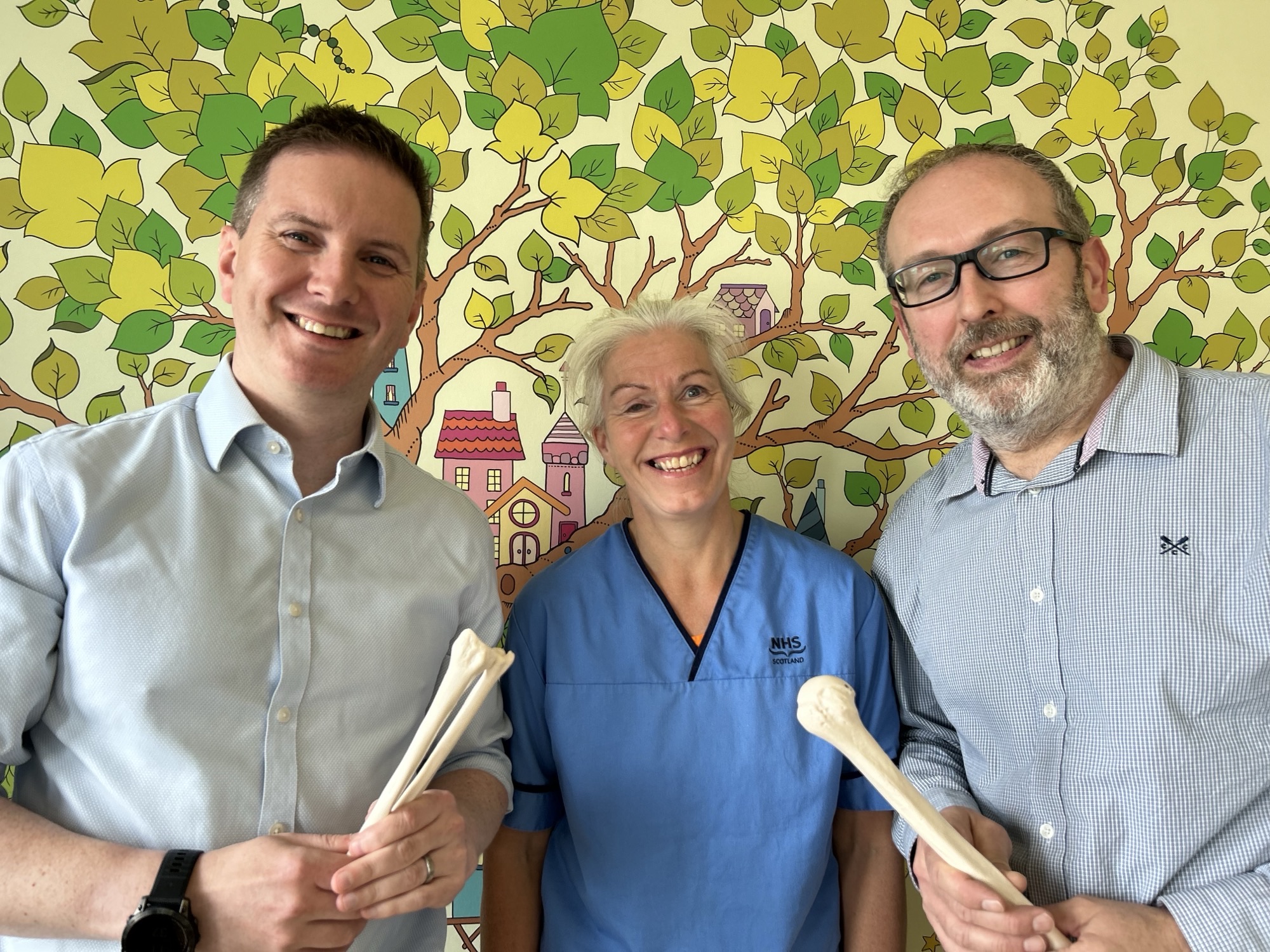Aberdeen surgeons contribute to UK study to improve their ‘CRAFFT’
Published: 24/06/2024 08:53NHS Grampian’s clinical research unit at Royal Aberdeen Children’s Hospital (RACH) is marking the end to the recruitment phase of national trials which will help improve treatments offered to children and young people across the UK and beyond.
The Children’s Radius Acute Fracture Fixation Trial (CRAFFT) is working to identify whether it’s better to treat broken wrist bones in patients up to the age of 11 by simply putting them in a cast and allowing the broken bones to heal and grow back into the right position naturally, or whether it’s better to put the bones back into the right position under a general anesthetic (which may involve inserting metal pins or plates).
The recruitment in Aberdeen has been led by paediatric orthopaedic consultant Mr Mike Reidy. He said: “This type of multi-centre research allows surgeons and researchers across the UK to work collaboratively to find the best treatment options for children’s fractures. A similar study – SCIENCE – has also recently completed recruitment and will allow surgeons to recommend the best way to treat a specific type of elbow fracture.”
Simon Barker has been the Aberdeen lead for SCIENCE and has recently completed a two-year term as the president for the British Society for Children’s Orthopaedic Surgery (BSCOS). During his presidency he championed research, multi-disciplinary working and equality and diversity within surgery.
Simon explained: “As one of the paediatric centres in Scotland, we’re heavily involved in research. We’re participating in seven trials across the breadth of paediatric orthopaedics and the Craig Research Unit team is a huge asset to the children's hospital. I’m lucky to be working alongside fantastic colleagues."
Mike, who was recently recognised by both the Scottish Committee for Orthopaedics and Trauma (SCOT) and the British Orthopaedic Trainee Association (BOTA) as the Scottish and the UK Trainer of the Year, is passionate about doctors in training becoming involved in research projects ongoing in the department.
Mike added: “We’re helping to answer big clinical questions – like the best way to treat broken wrists in children. Questions around what treatment is best have been around for decades but no one hospital treats enough patients to make a study work. We are the only paediatric centre in Scotland participating in CRAFFT and by working together with other centers across the UK we have reached the 750 patients needed to answer this important question. We are grateful to the children and families in Grampian who agreed to participate in this study, so we can better advise future patients on what treatment may be best for them.
“Projects like the CRAFFT trial mean we can be more confident about whether or not an operation is helpful when speaking with parents and carers. It’s much better than saying there is a lack of evidence.”
The RACH research unit team liaise with families on an ongoing basis, manage consent and collect the data needed to support the trial. This process will continue for the CRAFFT and SCEINCE studies for the next couple of years, as they gather information about the longer term recovery of the children.
Lead research nurse Maggie Connon said: “Supporting research can mean access to new treatments for families before they are embedded into clinical practice. As clinical research nurses, we work on many different specialities which are led by physicians depending on their particular interest.
“We often see the difference it makes to families, and the benefit of access to possible new ways of treating conditions as well as extra support from the paediatric team throughout their clinical trial participation. Clinical research provides the evidence for safe, new treatments, health technology or new ways of providing care to children and young people. It’s really worthwhile being part of it.”
Maggie's small team supports a wide variety of clinical trials on everything from the best post treatment diets for inflammatory bowel disease, to using immunotherapy to treat allergies and even exploring safe doses for using botox to treat overactive bladders in teenagers. Studies often take years to complete and the results are published after the long-term impacts on children have been fully analysed.
Maggie's small team supports a wide variety of clinical trials on everything from the best post treatment diets for inflammatory bowel disease, to using immunotherapy to treat allergies and even exploring safe doses for using botox to treat overactive bladders in teenagers. Studies often take years to complete and the results are published after the long-term impacts on children have been fully analysed.
Find out more about Royal Aberdeen Children’s Hospital: www.rach.scot.nhs.uk

